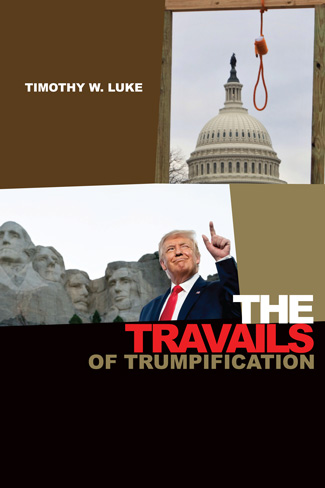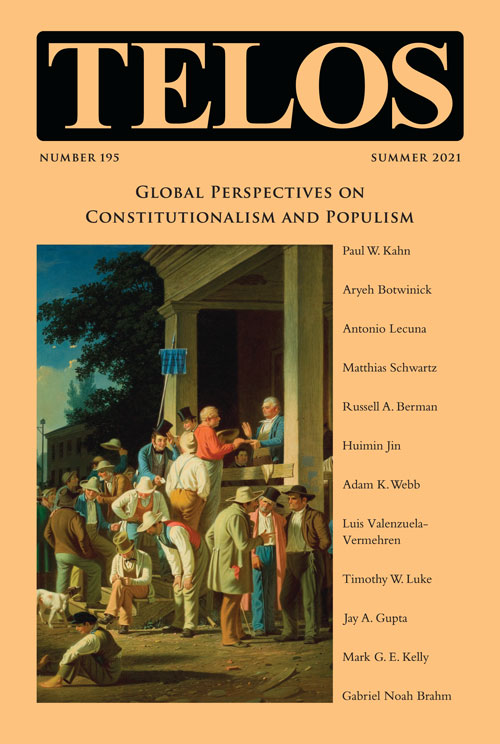By Telos Press · Tuesday, May 3, 2022 In his new book, The Travails of Trumpification, a series of critical essays written over the course of Donald J. Trump's presidency, Timothy W. Luke explores how the recent twists and turns in the civic life of the United States have precipitated a dangerous transformation of American political culture. Tim recently talked with Mark S. Weiner about the book and the current precarious state of U.S. politics.
Continue reading →
By Telos Press · Wednesday, December 1, 2021 Now available from Telos Press: The Travails of Trumpification, by Timothy W. Luke. Order the paperback edition today in our online store and save 20% by using the coupon code BOOKS20. Also available in Kindle ebook format at Amazon.com.
The Travails of Trumpification
by Timothy W. Luke
 Telos Press Publishing is delighted to announce the release of Timothy W. Luke’s new book, The Travails of Trumpification. In this series of critical essays written over the course of Donald J. Trump’s presidency, from its chaotic early days to its calamitous end, Luke explores how the recent twists and turns in the civic life of the United States have precipitated a dangerous transformation of American political culture. Since 2016, Trump’s will to attain, and then retain, his office by whatever means necessary crossed red lines never before violated by any previous presidential administration. Even before his loss in the 2020 election, Trump sought to discredit America’s electoral process by challenging legal voting practices in key swing states on social media, in the courts, through executive agencies, and finally with violent riots, culminating in the disastrous attack on the U.S. Capitol on January 6, 2021. Yet while Trump himself no longer remains president, the “Trumpification” of the American political system persists today, with the majority of Republican politicians as well as Trump’s millions of devoted followers still firmly in the grip of his influence. The goal of the critical probes collected in this volume is to evaluate the “travails,” or excessive tribulation, pain, hardship, anguish, and agony, that his dangerous demagoguery has inflicted—and continues to inflict—on the nation’s democratic institutions and processes. Telos Press Publishing is delighted to announce the release of Timothy W. Luke’s new book, The Travails of Trumpification. In this series of critical essays written over the course of Donald J. Trump’s presidency, from its chaotic early days to its calamitous end, Luke explores how the recent twists and turns in the civic life of the United States have precipitated a dangerous transformation of American political culture. Since 2016, Trump’s will to attain, and then retain, his office by whatever means necessary crossed red lines never before violated by any previous presidential administration. Even before his loss in the 2020 election, Trump sought to discredit America’s electoral process by challenging legal voting practices in key swing states on social media, in the courts, through executive agencies, and finally with violent riots, culminating in the disastrous attack on the U.S. Capitol on January 6, 2021. Yet while Trump himself no longer remains president, the “Trumpification” of the American political system persists today, with the majority of Republican politicians as well as Trump’s millions of devoted followers still firmly in the grip of his influence. The goal of the critical probes collected in this volume is to evaluate the “travails,” or excessive tribulation, pain, hardship, anguish, and agony, that his dangerous demagoguery has inflicted—and continues to inflict—on the nation’s democratic institutions and processes.
Continue reading →
By David Pan · Friday, June 18, 2021 Telos 195 (Summer 2021): Global Perspectives on Constitutionalism and Populism is now available for purchase in our store. Individual subscriptions to Telos are also available in both print and online formats.
 After watching the images of the January 6 Capitol riot, many Americans concluded that right-wing populism threatens the basic rules of our constitutional order. In this view, the U.S. Constitution establishes a universal order that is detached from any particular orientation and provides the neutral ground upon which differences can be discussed, while populists upset the rules of discussion and destroy the basis of a common project. Consequently, since populism is at odds with the Constitution, the solution would be to try to reimpose a measure of rationality upon the unruly. Yet the nagging concern behind this perspective is not just the violation of rules but the suspicion that populism is ultimately motivated by racism and sexism. In this case, the real opposition would not be between constitutionalism and populism but between two understandings of the Constitution, that is, two conceptions of the character of the people, one egalitarian and the other racist. The difficulty is that the laws of a constitution cannot exist independently of a people with a specific history. Rules cannot be neutral but imply a perspective on the world, and the conflict between constitutionalism and populism may in fact be a symptom of a conflict between two factions within the people, each of which is attempting to establish itself as the proper representation of the will of the people as a whole. After watching the images of the January 6 Capitol riot, many Americans concluded that right-wing populism threatens the basic rules of our constitutional order. In this view, the U.S. Constitution establishes a universal order that is detached from any particular orientation and provides the neutral ground upon which differences can be discussed, while populists upset the rules of discussion and destroy the basis of a common project. Consequently, since populism is at odds with the Constitution, the solution would be to try to reimpose a measure of rationality upon the unruly. Yet the nagging concern behind this perspective is not just the violation of rules but the suspicion that populism is ultimately motivated by racism and sexism. In this case, the real opposition would not be between constitutionalism and populism but between two understandings of the Constitution, that is, two conceptions of the character of the people, one egalitarian and the other racist. The difficulty is that the laws of a constitution cannot exist independently of a people with a specific history. Rules cannot be neutral but imply a perspective on the world, and the conflict between constitutionalism and populism may in fact be a symptom of a conflict between two factions within the people, each of which is attempting to establish itself as the proper representation of the will of the people as a whole.
Continue reading →
By Telos Press · Thursday, May 13, 2021 In today’s episode of the Telos Press Podcast, David Pan talks with Jay Gupta, Mark G.E. Kelly, and Timothy W. Luke about the U.S. Capitol riot on January 6, 2021. Their discussion covers a range of topics, including the main causes of the riot, the cultic character of Trump’s supporters, whether the breach of the Capitol was more about symbolism or substance, the declining legitimacy of U.S. political institutions and the loss of faith in the Constitution, the rhetoric of democracy, populism as a rebellion against the administrative deep state and managerial capitalism, the changing politics of race and racial divides, and the realignment of Democratic and Republican coalitions in the wake of Trump. Telos 194 (Spring 2021) features a group of essays on the U.S. Capitol riot, excerpts of which appear here. Click through to read the full articles at the Telos Online website (subscription required). To learn how your university can subscribe to Telos, visit our library recommendation page. Print copies of Telos 194 are available for purchase in our store.
Continue reading →
By David Pan · Friday, March 19, 2021 Telos 194 (Spring 2021): Political Theology Today is now available for purchase in our store. Individual subscriptions to Telos are also available in both print and online formats.
 What does political theology mean today? At the Telos-Paul Piccone Institute conference from which many of the essays in this issue originated, a primary goal was to discuss the crisis of secular liberalism and “how faith is reshaping culture and politics today.” But even this project perhaps limits too much the scope of political theology, implying that we have a choice between reason and faith, or that political theology is a commitment to faith rather than an analysis of the element of faith that underlies all of our endeavors. The idea of political theology begins with the premise that every existing human order is built upon some understanding of ultimate meaning. The task would then be to analyze the kind of meaning that each existing order embodies and determine the kinds of decisions about meaning that are made and need to be made at various points in its history. Even secular liberalism, to the extent that it constitutes an existing order, presumes some answer to this question of meaning, and a closer look at the political theology of the United States reveals a mythic dimension that underlies its liberal democratic processes. The essays in this issue examine the political theological underpinnings of economy, politics, technology, and religion, laying out the ways in which these areas of human life develop not as autonomous spheres but as the result of struggles over a set of political theological choices. What does political theology mean today? At the Telos-Paul Piccone Institute conference from which many of the essays in this issue originated, a primary goal was to discuss the crisis of secular liberalism and “how faith is reshaping culture and politics today.” But even this project perhaps limits too much the scope of political theology, implying that we have a choice between reason and faith, or that political theology is a commitment to faith rather than an analysis of the element of faith that underlies all of our endeavors. The idea of political theology begins with the premise that every existing human order is built upon some understanding of ultimate meaning. The task would then be to analyze the kind of meaning that each existing order embodies and determine the kinds of decisions about meaning that are made and need to be made at various points in its history. Even secular liberalism, to the extent that it constitutes an existing order, presumes some answer to this question of meaning, and a closer look at the political theology of the United States reveals a mythic dimension that underlies its liberal democratic processes. The essays in this issue examine the political theological underpinnings of economy, politics, technology, and religion, laying out the ways in which these areas of human life develop not as autonomous spheres but as the result of struggles over a set of political theological choices.
Continue reading →
By Russell A. Berman · Tuesday, January 26, 2021 Bruno Retailleau represents the Vendée in the French Senate, where he has been serving as President of The Republican group since 2014. His comments prompted by the storming of the Capitol in Washington on January 6 provide a useful European perspective, an alternative to the polarized discourse that has predominated in the United States. In addition to a pointed evaluation of the events themselves, his remarks also offer insight into political positioning in France in advance of the 2022 presidential election: as we are on the eve of the post-Merkel era in Germany, a post-Macron France may be approaching as well. More importantly, however, Retailleau reminds us that what happened in Washington is indicative of tendencies that are not exclusively American. He describes root causes of some contemporary social conflict, treating the Washington riot as symptomatic of tensions as present in France as in the United States, as well as across the West. At stake is more than Trump’s rhetoric, the impeachment debate, or the response to the 2020 presidential election outcome. The issues that fueled the populism of the past four years have not disappeared. Retailleau shows why.
Continue reading →
|
|





